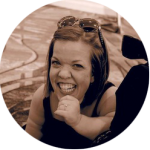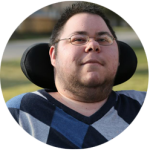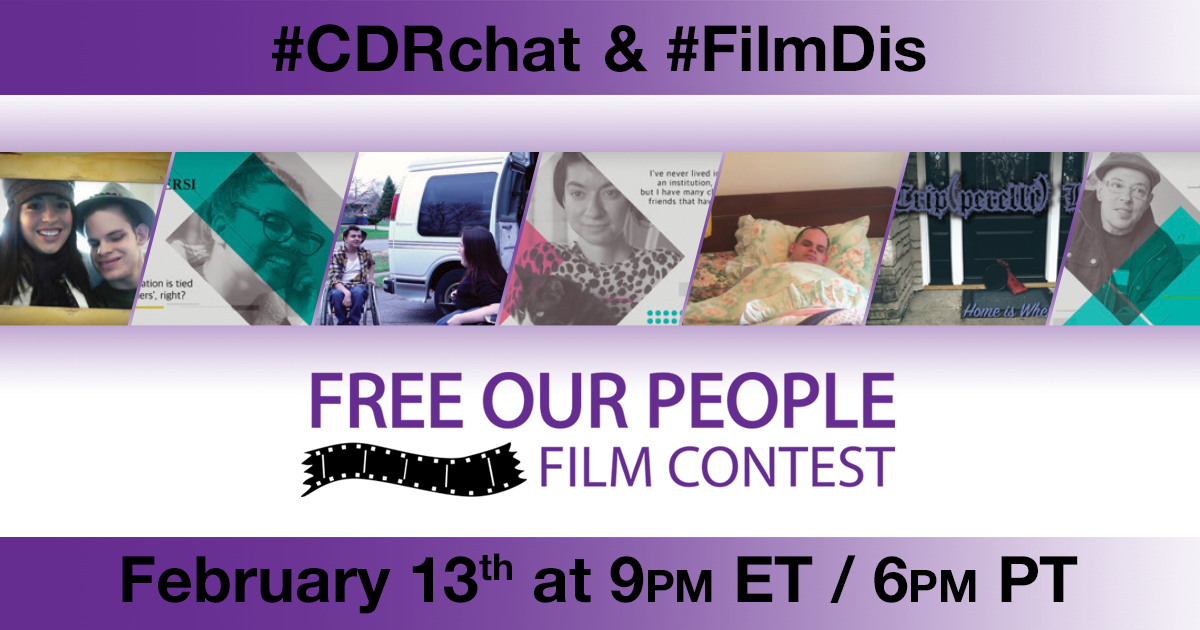- A
- A
- A
Do you want to share your ideas or stories of institutional bias involving people with disabilities? Do you want to learn how one can make a short film and participate in the Free Our People Film Contest & Festival and support their mission of independent living? You are welcome to join the #CDRchat Twitter chat! The #CDRchat in collaboration with #FilmDis will be co-hosted by Leah Smith, a disability advocate and communications professional, and Dominick Evans, filmmaker and founder of #FilmDis. Tune in on Thursday, February 13th, at 9pm EST!
Check out the questions below for you to answer during the Twitter chat on the 13th! If you can’t make it, feel free to tweet your answers after the chat!
How to Participate:
Follow @CDRNYS, @LSmithOnFire, and @dominickevans on Twitter
When it’s time, search #CDRchat on Twitter for the series of live tweets under the ‘Live’ tab for the full conversation.
If you might be overwhelmed by the volume of tweets and only want to see the chat’s questions, check @CDRNYS’ tweets. Each question will be tweeted 4-5 minutes apart.
Check out this explanation of how to participate in a Twitter chat by Ruti Regan:https://storify.com/RutiRegan/examplechat
Check out this captioned #ASL explanation of how to participate in a chat by @behearddc
https://www.facebook.com/HEARDDC/videos/1181213075257528/
Please remember to use the #CDRchat hashtag when you tweet.
If you respond to a question such as Q1, your tweet should follow this format: “A1 [your message] #CDRchat”
Q & A with Leah and Dominick:
Q1. What is the Free Our People Film Contest @FOP and how can filmmakers enter? #FilmDis #CDRchat
Q2. What is institutional bias, and why is it the theme for the Free Our People Film Contest? #FilmDis #CDRchat
Q3. What do filmmakers have the potential to win if they enter the Free Our People Film Contest? #FilmDis #CDRchat
Q4. How does the Free Our People Film Contest encourage the inclusion of disabled filmmakers and actors? Can nondisabled filmmakers enter the contest? #FilmDis #CDRchat
Q5. What are the parameters filmmakers need to follow in order to submit a film to the Free Our People Film Contest? #FilmDis #CDRchat
Twitter Chat Questions:
Q6. What kind of harm comes to disabled people because of institutional bias? #FilmDis #CDRchat
Q7. Why do you feel it is so important for nondisabled people to understand why disabled folks deserve to live in their own homes/communities if they want to? #FilmDis #CDRchat
Q8. What other ways can we contribute to the narrative on the institutional bias, so that people understand what an issue it truly is? #FilmDis #CDRchat
Q9. How has current US policy threatened the freedom of disabled people to live in their own homes and communities? #FilmDis #CDRchat
Q10. What do home and community-based services mean to you? #FilmDis #CDRchat
Co-Hosts’ Biographies:

Leah Smith is a writer, communications professional, disability advocate and mom. Leah holds a Bachelor’s in Public Relations and a Masters in Public Administration and Policy. She has focused her career on creating access and equality for all. Leah currently resides in San Diego with her partner, daughter and two dogs.

Dominick Evans is a filmmaker, writer, disability and LGBTQIA activist, gamer, and dad. He is the founder of #FilmDis, a Twitter chat about disability in the media, and nonprofit media monitoring organization. He also serves on the board of Not Dead Yet and is a part of the ADAPT media team. Dominick has a BFA in Film from the Tom Hanks Center for Motion Pictures. His work revolves around developing media while fighting for inclusion and better portrayals of disabled people in film and television.
